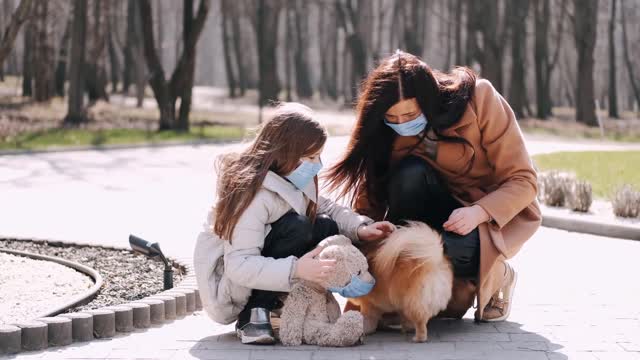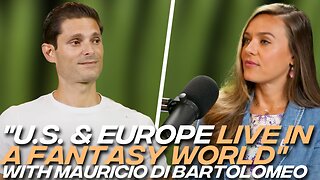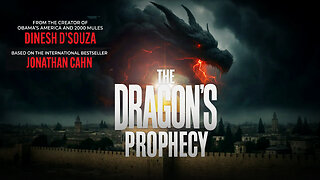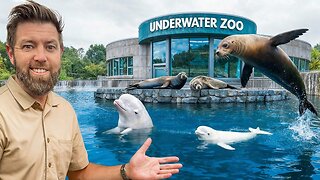Premium Only Content

Why do dogs protect babies?
Why do dogs protect babies?
A dog's relationship with babies is enough to make anyone sigh! A well-mannered dog that receives positive reinforcement usually creates a very strong bond with its human family. Some are particularly fond of children and babies.
In addition to providing lots of affection, many dogs can develop a protective instinct toward their human companions. This means that they wish to safeguard their well-being and end up exhibiting certain types of behavior toward their guardians. But where does this protective instinct come from and what does it look like?
The domestication of dogs has lasted for millennia, but the animal still retains some aspects of its wild nature, especially the behavioral aspects that relate to its survival instincts and pack mentality. Some instinctive attitudes are problematic, especially those related to hunting, others can be beneficial as long as they are channeled in an appropriate way.
When a dog lives with a family that has babies and children, the need for protection can arise in the pet. The dangers from which they feel the need to protect the babies may vary. Some may think that any unknown person is a potential threat, others may only protect from animals. However, this will only happen if the dog is allowed to interact with the baby and considers it family.
All dogs can demonstrate the protective instinct with children and babies, but in fact there are some breeds that are more prone to this behavior, such as: German shepherd, rottweiler, and doberman. Part of the reason for this is that these dogs were bred specifically to develop guarding skills.
While these behaviors may be natural, we also need to be careful. All dogs are individuals and breed plays only a part in their behavior and temperament.
Some researchers claim that dogs recognize humans as part of their pack, others that they identify as part of their social group. From their social groups, dogs receive affection, food, and care. When faced with a threat, the pack will protect each other, with the adults being especially protective of the puppies.
As mentioned earlier, some breeds are more inclined to protect than others. But this does not mean that every dog of a certain breed will behave in the same way.
One ability of dogs is to easily perceive hormonal changes in humans, this makes them able to perceive fear and anxiety around the most vulnerable in their social group, such as babies. When the dog realizes that the baby depends on its parents for survival, this can trigger its instinct to also provide protection.
Another reason why we may know why dogs protect babies is due to a different aspect of neurological programming. Studies have shown that humans react to the 'schema' of babies and dogs. This means that 'cuteness' seems to appeal to our instincts, it is one of the reasons for attesting to our love for puppies and kittens, even though they are not of the human species. We naturally feel protective and affectionate towards them. Although it is difficult to determine, it is possible that dogs respond in a similar way to humans.
This affection for human babies occurs because the dog has been properly socialized, and if not, it is possible that it will develop aggressive behavior as a result of competition for attention and space. Since babies like to pull things, it is also possible that a poorly socialized dog will bite or try to bite a baby if it finds it threatening.
Building a healthy relationship between a dog and the baby in the home is crucial for everyone's well-being. This requires encouraging the dog's protective instincts and using positive reinforcement. However, it's also possible for a dog to become overprotective, so we need to encourage this bond in a balanced way.
Part of this socialization will depend on the circumstances of when the baby comes into the family. The baby may have arrived first and the dog is introduced later, or it may be the other way around.In either circumstance it can be difficult, as dogs are animals of habit and routine. There is a possibility that the arrival of a baby in the family will make the dog feel threatened or insecure, especially if it does not receive as much attention as before.
In any case, the dog and baby should be introduced slowly and with constant supervision. Under no circumstances should they be left alone, even if the dog is quiet. You don't need to use treats to reinforce the bond, comforting voices and affection is enough.
We also need to know that it is vital not to scold the dog in front of the baby, because it is possible that the dog will make a negative association and try to attack, prefer to remove the baby from the environment and teach the animal the correct thing to do.
After the child grows up it is necessary to teach it to interact as a dog.
-
 35:04
35:04
Uncommon Sense In Current Times
17 hours ago $0.24 earnedPop Marxism & America’s History Crisis | Dr. Eric Patterson on Education, Freedom & Cultural Renewal
7.93K4 -
 7:18
7:18
The Shannon Joy Show
16 hours agoThe Medical Freedom Community is TURNING on Trump
4.93K8 -
 1:56
1:56
NAG Daily
16 hours agoQUICKFIRE NEWS HEADLINES W/GreenMan Reports
3.22K -
 LIVE
LIVE
BEK TV
23 hours agoTrent Loos in the Morning - 10/10/2025
159 watching -

The Bubba Army
22 hours agoKimmel Invites TRUMP On His Show | Bubba the Love Sponge® Show | 10/10/2025
25.3K1 -
 46:59
46:59
Coin Stories with Natalie Brunell
17 hours agoBorrow Dollars, Hold Bitcoin: The Debasement Play with Mauricio Di Bartolomeo
55.6K5 -
 2:59:23
2:59:23
Side Scrollers Podcast
21 hours agoAssassin’s Creed CIVIL War CANCELLED + Hasan Caught in LIE About Dog Collar + More | Side Scrollers
90.2K24 -
 1:33:41
1:33:41
Dinesh D'Souza
1 day agoThe Dragon's Prophecy Film
66.9K33 -
 15:10
15:10
Dr Disrespect
2 days agoI FINALLY Beat Baby Steps
136K16 -
 19:54
19:54
Forrest Galante
4 days agoPrivate Tour Of America's Best Marine Animal Facility
114K15